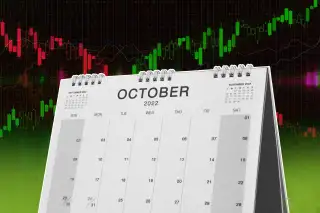October Is Usually the Most Volatile Month for Stocks. What Can We Expect This Year?

October can be a spooky month for investors.
"If you thought September’s volatility was bad, just wait until October, which has typically been 36% more volatile than the average of the other 11 months of the year," Sam Stovall, chief investment strategist at CFRA Research, wrote in a recent research note.
Stocks aren't starting October on a great note. All three major stock indexes were in bear markets in September, and if the market is feeling especially volatile to you this year, there's a reason: The frequency of intraday swings of 1% or more for the S&P 500 has been “extremely elevated” in 2022, according to LPL Financial portfolio strategist George Smith.
There's also a market assumption called the "October effect" that has some investors worried about prices taking a dive.
Here's what you need to know about the potential for higher volatility and how financial advisors say to manage it.
What is the 'October effect' in the stock market?
The "October effect" refers to the psychological anticipation that stock prices will plunge this month because they have during some Octobers of the past, like the stock market crashes of 1929 and 1987. In other words, the month has gotten a bad reputation, even if it doesn't deserve it.
Experts say there isn't much fact behind the October effect. In fact, October tends to be a better month for the stock market than September, when the S&P 500 has seen positive returns just 44.7% of the time since 1928, according Bespoke Investment Group data from early last month. What's more, we're entering what is historically the stock market's best three-month period of the year. (However, seasonal trends based on past data are far from guarantees.)
People tend to start talking about the October effect more when September goes badly, says JR Gondeck, managing director and partner at The Lerner Group at Hightower Advisors — and stocks certainly took a hit last month. October is also when a lot of companies report their quarterly earnings, which can exacerbate the negative market sentiment, he adds.
What investors can expect in October
Historically, October has actually been a positive month for stocks, resulting in an average boost of around 0.9% for the S&P 500 since 1945, CFRA found.
Plus, after especially rough Septembers, stocks tend to bounce back in October, according Ryan Detrick, chief market strategist at Carson Group. Since 1974, a 7% or more drop for the S&P 500 in September was followed by strong turnarounds in nearly every October that followed (2008 was the one exception). For example, in 2011 the index fell 7.2% in September, then gained 10.8% in October.
Still, as Stovall points out, October can also be really volatile. This year, markets are dealing with a lot of uncertainty, like whether the Federal Reserve will continue to hike interest rates to curb inflation — a move that also often brings down the prices of financial assets like stocks and bonds. It never hurts to be prepared for the potential of a rollercoaster-like month in the stock market.
How should investors manage volatility?
If you're scared of potentially high volatility this month, remember that you've already experienced a lot of ups and downs this year.
"October came early," jokes Craig Ferrantino, a certified financial fiduciary and founder of Craig James Financial Services. "We’re getting hit already."
In other words, don't panic. That advice tends to be what financial advisors recommend for year-round: Avoid making knee-jerk reactions to market moves and instead focus on maintaining a long-term investing strategy that will allow your portfolio to weather the more volatile periods.
A diversified portfolio with a mix of assets like stocks and bonds that aligns with your goals, time horizon and risk tolerance is likely to do much better for you than reacting to volatility and trying to time the market.